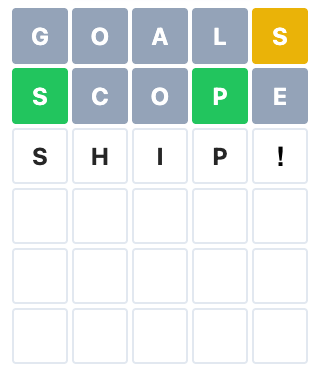No, I don’t mean texting your college roommates and your aunt daily PRDs with a string of green and yellow boxes.
But I’ve found that playing Wordle is a metaphor for effective product leadership that holds up in a shocking number of dimensions. Wordle isn’t about guessing blindly, it’s about using limited information to make increasingly informed decisions. Product development works the same way. Each release, each experiment, each customer conversation gives you a little more signal. And like Wordle, you’re rarely told outright when you’re on the right track, you have to interpret the clues and adjust accordingly.
One of the core tensions in product leadership is the need to provide vision and certainty in an environment that’s fundamentally uncertain. Great product leaders project confidence, but behind the scenes they’re constantly adapting. They’re running experiments, shifting priorities, and testing hypotheses, all while steering the ship forward. Playing Wordle while giving a TED talk, basically.
And just like in Wordle, there are ways to play smarter.
Use past attempts to inform your next move. In Wordle, you don’t waste guesses repeating letters that have already proven wrong. In product, the feedback loop is messier, but no less valuable. Maybe a feature flopped. Maybe a launch underperformed. That doesn’t always mean the core idea was bad. Timing, positioning, implementation, or the user segment could have been off. Great teams don’t just record what failed, they interrogate why it failed.
Recognize patterns. You don’t need a linguistics degree to win at Wordle, but understanding prefixes, suffixes, and common word structures helps a lot. In product, it’s the same. Over time, you develop an intuition for what tends to work: conversion patterns, pricing models, engagement hooks. Pattern recognition isn’t a shortcut to certainty, but it tilts the odds in your favor.
Run high-signal experiments. In Wordle, “PEPPER” is not a good first guess, and generally (especially early on) it’s best not to waste guesses on words with repeating letters. Instead, you should try combinations that reveal the most. “PEPPER” only has three different letters, “TRASH” has six different letters including commonly used R, S, and T. The same principal applies for product: the best teams prioritize experiments that will teach them the most, not just the ones that seem most likely to succeed. You’re not just shipping features, you’re generating information. As Brian Armstrong put it, “Action produces information.” You can’t learn from an idea that stays in a doc, and you won’t definitively know if you’re right or wrong by having another meeting.
Take real action. Which brings us to possibly the most salient point. You only get feedback in Wordle when you make an actual guess. All the theorizing in the world won’t tell you if “CRANE” is the right word until you submit it. In product, the only way to learn is by shipping - by putting something in front of real users and seeing how they respond. You don’t find product-market fit by holding meetings. You find it by making moves.
Now, this metaphor isn’t perfect, but the differences can make the metaphor even more instructive. In Wordle, you get six tries. In product, there’s no set number of turns, but there is a clock. You’re racing against competitors, market shifts, and resource constraints. That’s why speed matters. The more “words” (aka real-world product attempts) you put out, the more chances you have to converge on the right answer. Waiting for perfect information just means someone else gets there first.
Each iteration gives you a bit more clarity, but never the full picture. So your job as a product leader is to make the smartest possible move with the data you have, then move again. Use common letters. Don’t repeat obvious mistakes. Don’t guess blindly, but don’t freeze either.
And whatever you do, don’t start a group chat to endlessly debate what word to guess next. Make your guess based on the information you have, explain why you made it, learn, and repeat. That’s product leadership.
